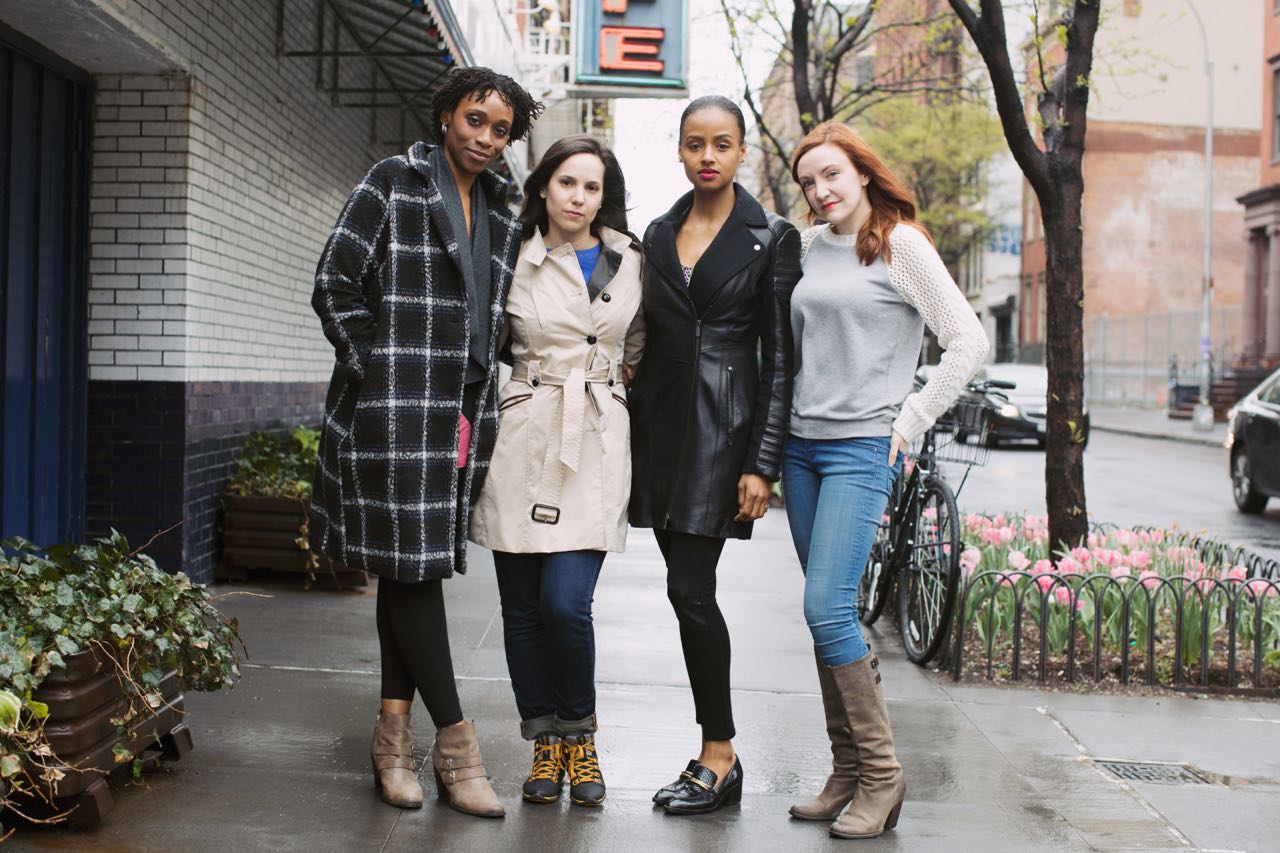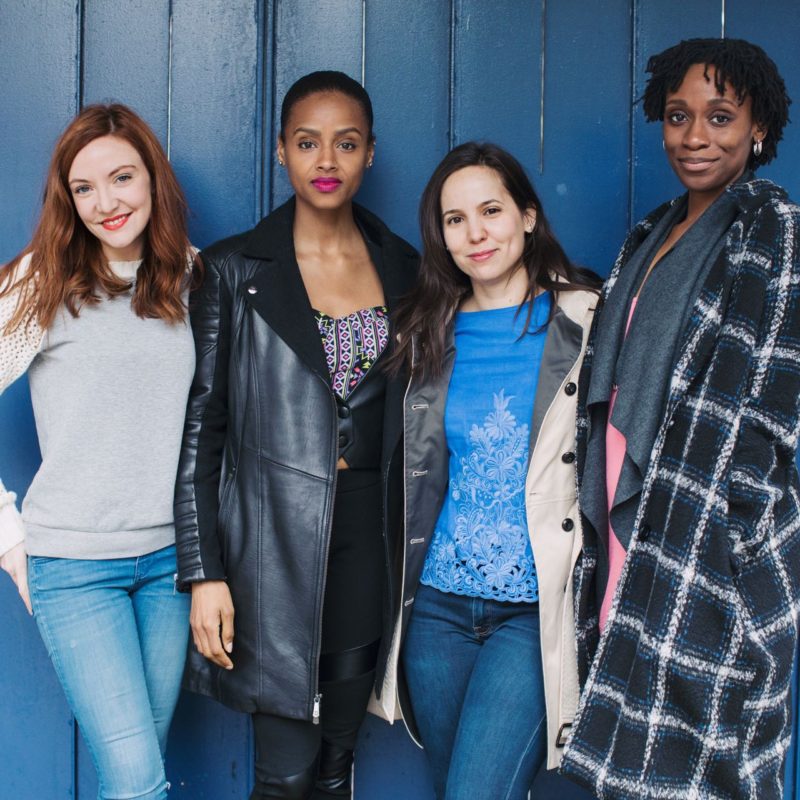Actress Roundtable: New Plays, Off-Broadway
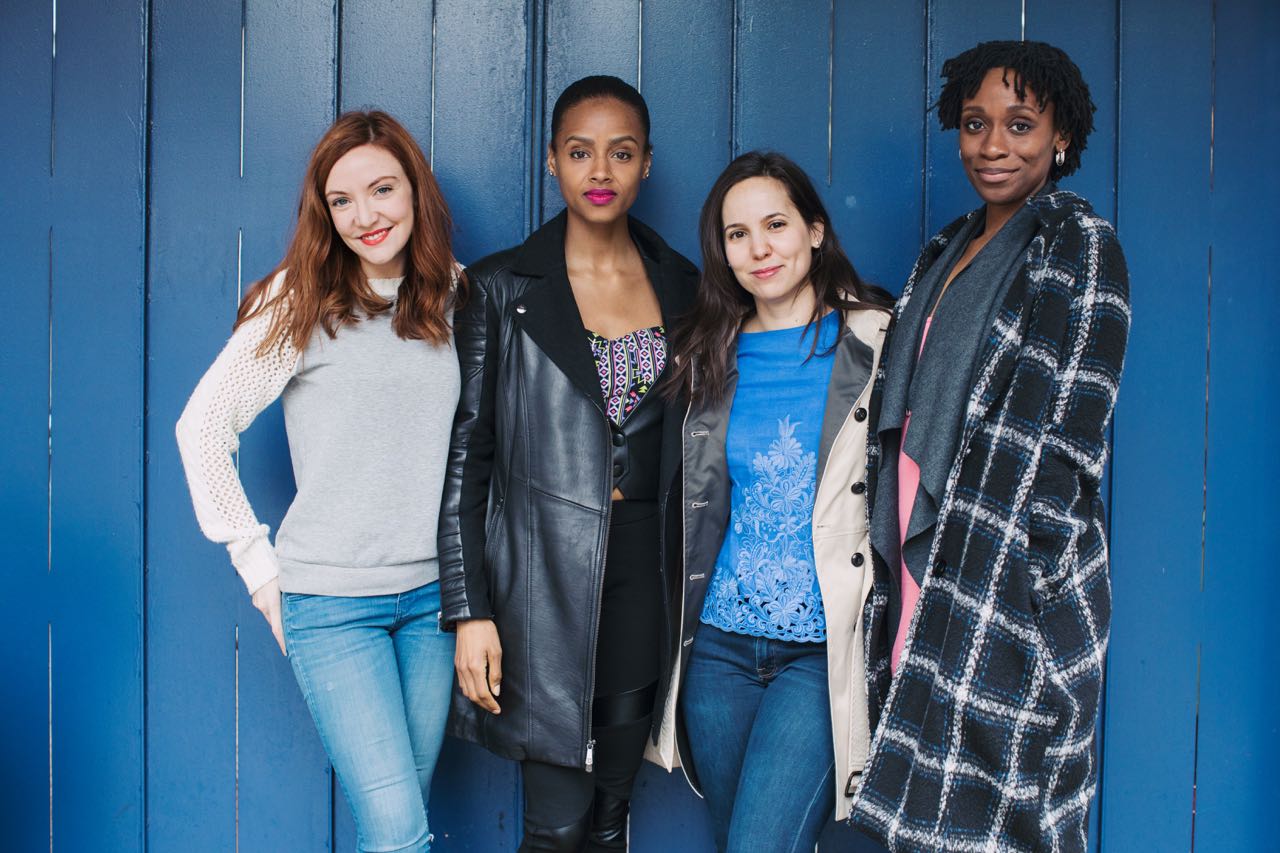
Written by Victoria Myers
Photography by Jacqueline Harriet
May 4th, 2017
Over the last year, there’s been an increased amount of attention to working Off-Broadway, most notably with the Fair Wage Onstage campaign, which advocated for higher compensation. The campaign was significant not only for helping artists to earn a wage that allows them to live in New York City, but that was in line with their contributions to the field. Off-Broadway is an incubator for new work—especially work by women, which has a harder time getting produced on Broadway. We recently sat down with four actresses, all of whom are currently or have recently been in productions of new plays Off-Broadway—Annie Dow of Fade at Primary Stages, Lakisha Michelle May of Sojourners at NYTW, Chinasa Ogbuagu of Sojourners and Her Portmanteau at NYTW, and Sarah Street of Rebel in the Soul at the Irish Repertory Theatre—to talk to them about the process and life of working on new plays Off-Broadway.
At the moment, what is the most fascinating thing about the character you’re playing or just played?
Sarah: The character I’m playing is Phyllis Brown, and she’s a real person, so I got to research her and read her autobiography. I’ve never actually played a real person before, so it was just really interesting to take that into your preparation, and what you bring to your character, so that’s been really interesting for me, that this person actually existed, it’s not just a made-up character by a playwright.
Annie: I played a character named Lucia, who is loosely based on the playwright, very loosely based. And that was interesting in a similar way, because I couldn’t just be like, “Okay, let me just look at Tanya Saracho and copy everything she does,” because she’s not quite her, but having to figure out when to borrow and when to bring my own thing into it, and where this character intersects with who I am, and who this person originally is. I thought it was really interesting, and an interesting process that I’d never done before either.
Lakisha: The character I play is Moxie in Sojourners, and she is a young 16-year-old prostitute in the late ‘70s. This is a remount of Sojourners, so it’s fascinating to really focus on her youth this time around. That’s not something that we really looked at last time. It’s heartbreaking to play this girl who’s kind of trapped in this space, and doesn’t know how, but wants to get out of her situation. That’s what’s really interesting to me, and heartbreaking about it.
Chinasa: I’m playing two characters. I’m playing Abasiama and I’m playing Adiagha, and one woman is born and raised in Nigeria and the other woman is a Nigerian raised in America. What’s fascinating to me about these two women is that for the first time I’m playing Nigerians, Africans, who are not in war, not suffering from war or poverty or anything like that, but are actually going through situations that are not only familiar to me, but are familiar to anyone, because they’re dealing with family struggle, and parents and children, and sacrifice and love. I also find them fascinating because I recognize them so truly in myself and my own family, so I love that.
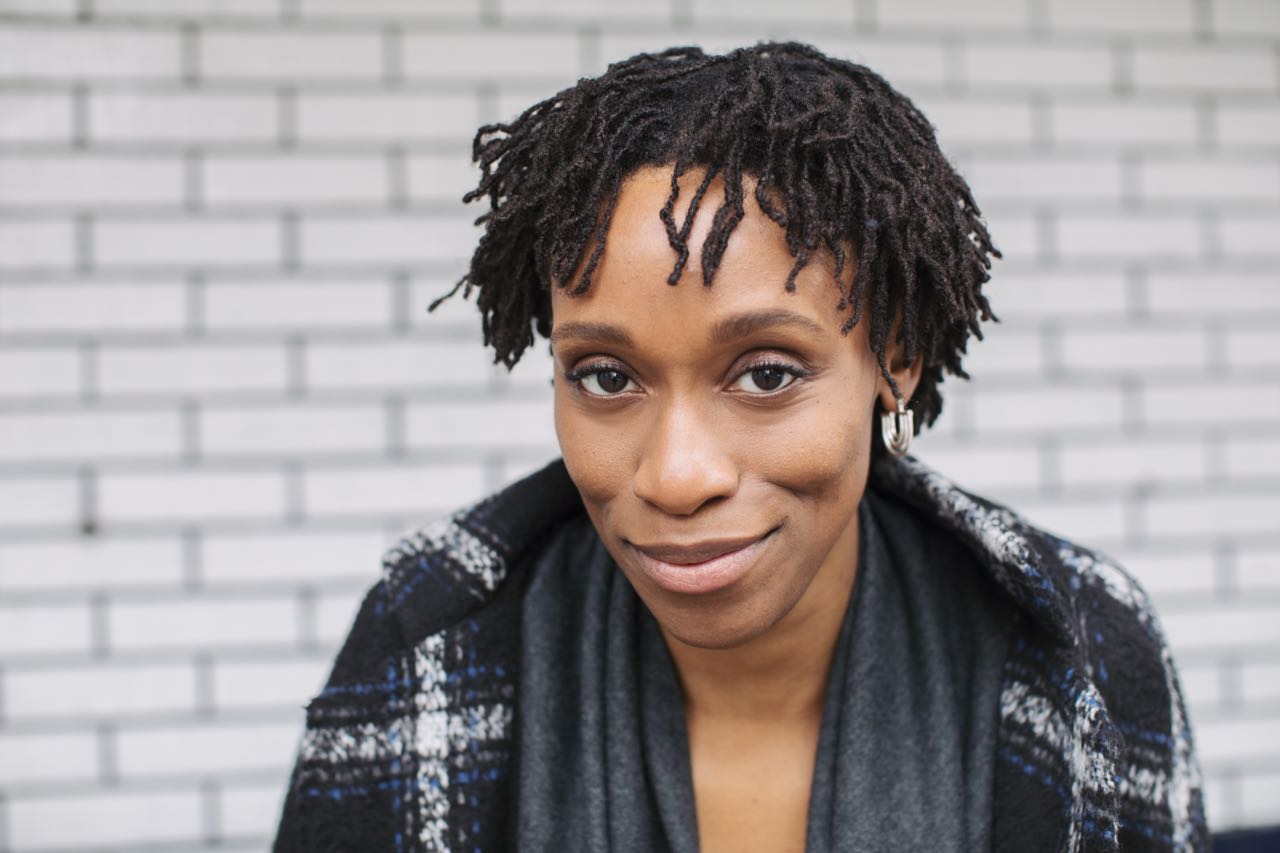
What part of the process do you find the most fulfilling? I know some actors favor rehearsal, some favor performance.
Chinasa: I love rehearsal. The first day of rehearsal feels like the first day of school. I think a lot of actors maybe feel that way. But I love getting to rehearsal and meeting the new cast. It feels very much like, “Oh, these are going to be my new friends for the next two months.” I’ve been very lucky to work with really fantastic people, and so I always end up having really lovely relationships and collaborations with people.
Lakisha: Ditto. I do enjoy rehearsal for exactly the reasons that Chinasa just said, but what I don’t like about rehearsal is I’m a bit of a perfectionist and someone who doesn’t like getting things wrong. That’s what rehearsal is all about. Rehearsal is all about trial and error, and risking and failing constantly. I am an actor because of the magic that happens when you’re on stage. When you’re on stage, it’s almost like some spirit invades your body. I kind of believe that when you’re truly connected, it’s not really you that’s up there speaking. You’re speaking for a lot of different people. My belief system is that there are spirits, and God and the universe are kind of speaking through you and using you in that moment for your art. It’s kind of amazing to me. So performance is my favorite.
Sarah: I think there’s no experience quite like being on stage in front of a live audience, and just that energy transfer between the audience and the players, and that contract you have between the storyteller and the audience. There’s something very magical about that. I really enjoy how different audiences respond to different things differently. There are certain things that will make a certain audience laugh, another audience won’t laugh at all at that. It’s just interesting. I do love rehearsal, because rehearsal is just kind of play, and you can kind of do no wrong in a sense. But being on stage, and even though it can be nerve racking, there’s just something very special about it.
Annie: I think my favorite part is probably the table reads at the beginning. I think there’s so much promise in them. We’re excavating the potential of a piece, especially if we’re lucky enough to have the playwright in the room and we’re lucky enough to be developing something. I think that’s when it’s at its most collaborative. So that’s my favorite part.
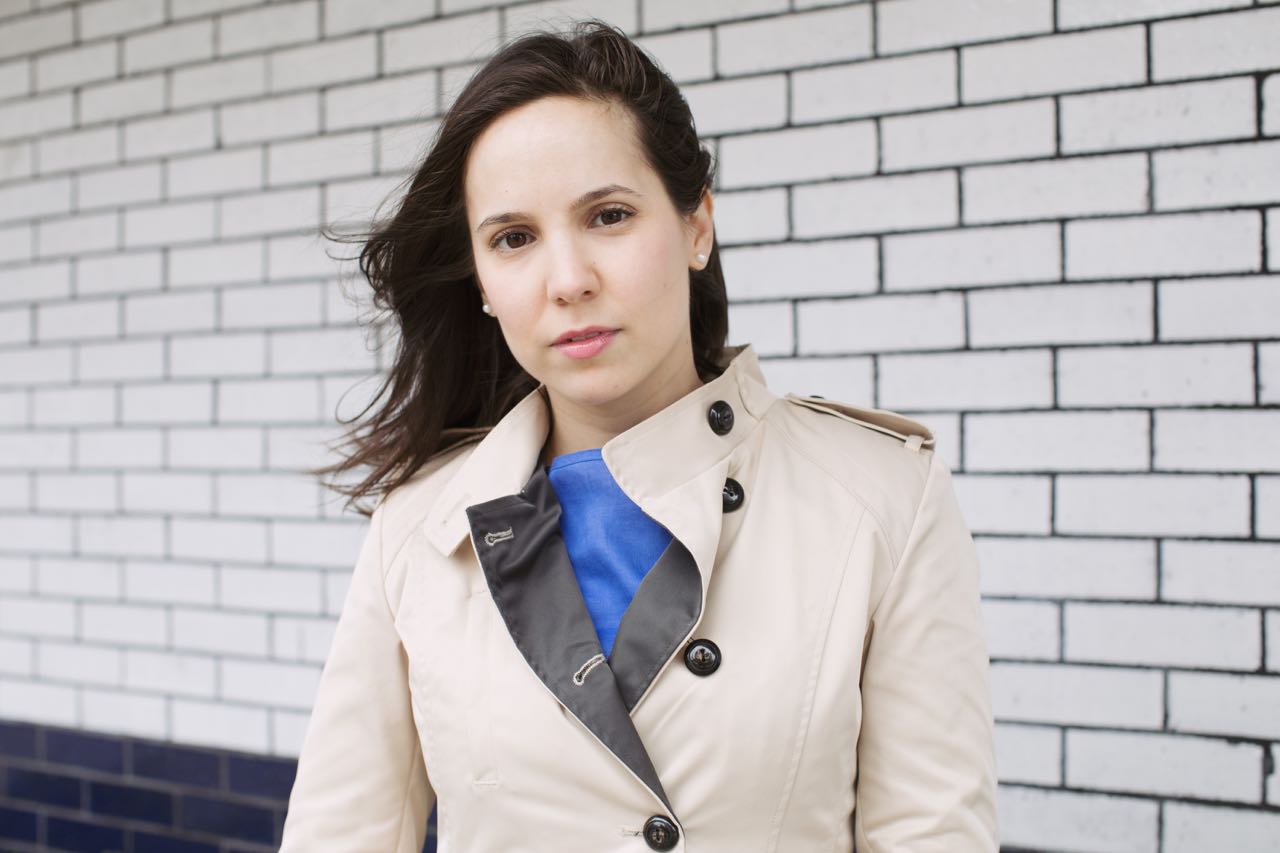
Do you all like to come into a process with a lot of work that you’ve done at home, or do you like to wait and see what’s going to happen in the room?
Annie: It really depends on the project. If the character feels further away from me, if there’s an accent or a behavior that needs to be added on, I’ll work on that before I show up in the room. But if the character feels a little closer to me, I’m more excited about what kind of impulses will kind of show up, and I don’t want to beat that dead horse to the ground by the time I get into rehearsal. For Lucia, because she had so many really long monologues, I worked a little bit on the text just trying to get those words into my mouth, but then I kind of left it alone until I got to rehearsal.
Lakisha: Same exact thing. Particularity with this play, because we’d done it already. Words come back to me kind of quickly, and it’s a gift but a curse too, because the rhythm of it and how I used to say it might be stuck in my head, so I definitely try to avoid that. Right before this, though, I worked on Everybody at the Signature, where we had to learn five parts and we could play [any one of] them at any moment. We all had winter break to learn our lines before we entered rehearsal, because we only had three weeks, and we had to learn five parts, so that was a way I’d never worked before. It was really disorienting because I like to learn my lines as I block the play because I can connect them to the physicality. With Sojourners, it was relearning with the physicality and trying to ignore certain rhythms that were stuck in my head from before.
Annie: How do you deal with changing physicality? I’m assuming the staging was a little different, and does that mess you up? Because I have the same process as you, and having to come back into a play would be a challenge.
Lakisha: It’s been challenging to explore what is an impulse now based off of something that is just remembered from last year. Chinasa’s dealing with the same thing because we both did the same play last year. It’s a huge challenge, especially now that we’re trying to explore her being younger, so I’m trying to make sure I tap into some youthful energy.
Chinasa: You can find yourself doing things and saying, “Wait, why am I doing that?”, because it was a choice from last year that catered to a certain set of circumstances due to the theatre, the space, or what you talked about. The one thing about having done the play before and doing it now is that we have the same cast. I think if we had a different cast, then that would be a whole other set of challenges. I don’t have a set process. It changes for every play. I think one thing that’s consistent for me is that I tend to panic every time a play comes around. I start to feel like I don’t even know how to do a play, like, “What is a play?” And then I take a moment, I calm down, and then I’m like, “Okay, you know how to do a play.” If I’m lucky enough to get the script before the first day of rehearsal, I will just read through it a couple of times and try to not make any judgments—I’ll read it just for story, and then start to do the fine-tuning once we get into rehearsal. I tend to be very general at first, and then get specific.
Sarah: I feel the same. The character I’m playing right now, there was a book that she wrote, so I read that. But unless there’s an accent to work on or something, I try to not really fuss with it too much before I get into the room because I really, really love the kind of process of just discovering spontaneous things. I love that process of discovering how a character moves her body while I’m in rehearsal, as opposed to just deciding that and doing it arbitrarily, and then I kind of don’t know why I’m doing it. So I try to, for the most part, leave myself alone until I get into the rehearsal room.
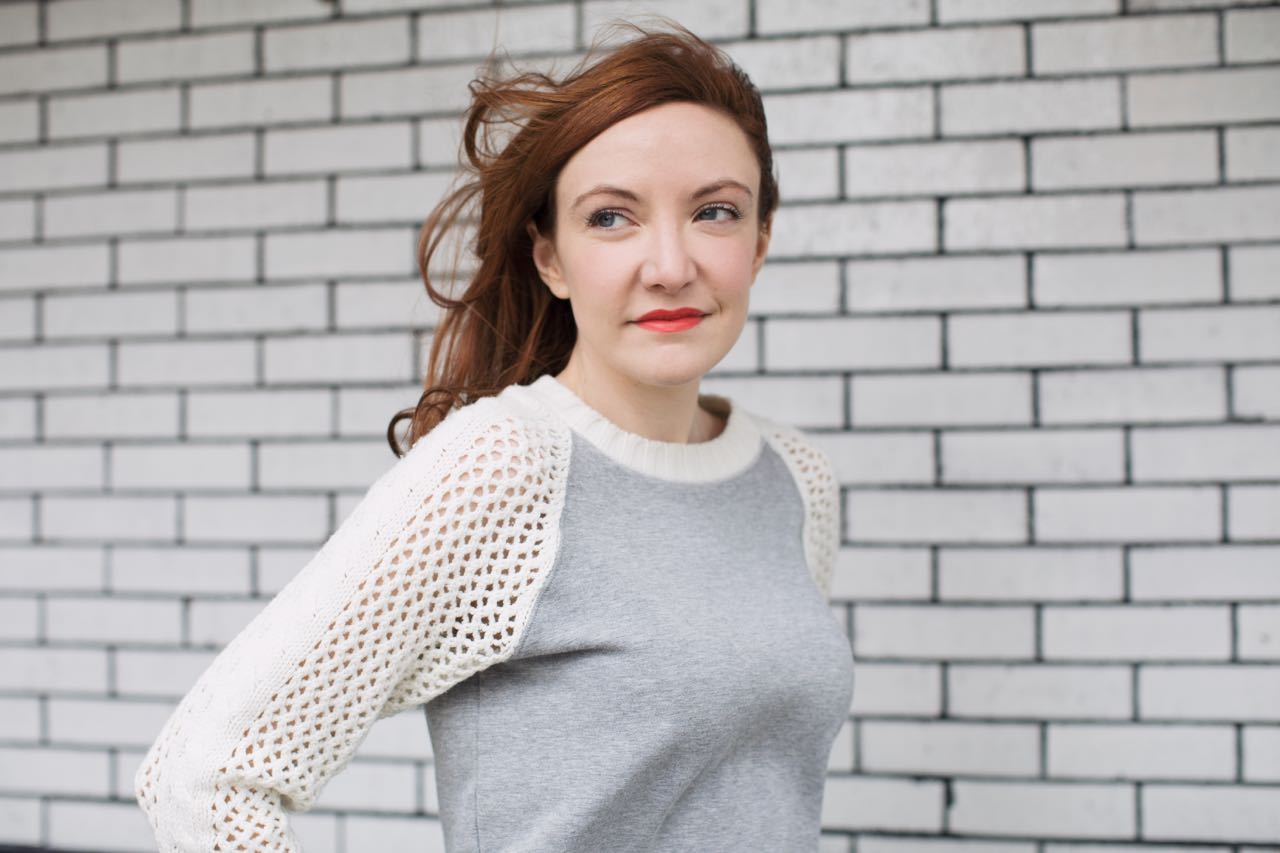
You’re all working on new plays. Are there any particular challenges that come with that?
Chinasa: What I love about new work is that it’s new, and that the playwright is often there. So you can have a conversation with the playwright about what their intention is and what they would like to see. I love that. The thing that can be challenging about new work is that it is ever-changing.
Lakisha: We just got changes last night at 9:45 PM.
Chinasa: Yes. We’re about to do a show tonight, and it’s hard when I’m working on a play that’s already in my body and there are changes happening there, and so I have to remind myself of a line that I’ve been saying for months and months and months that it’s different now. Then, the new play, that’s not quite in my body yet, I’m still learning new things because the playwright is still forming that play as well.
Sarah: You have to just be flexible. You can’t freak out. Similar things happen to us—very late in the rehearsal process, it was kind of like, “Oh, so this has moved around to here, this is now here, and we’re adding a scene for you,” and it was like, “Oh.” But you just say, “All right.” You just roll with it and don’t panic.
Lakisha: It’s also really cool because you are a part of the writing process. With Sojourners, I had done workshops of it and I remember improving a scene that Mfoniso [Udofia], the playwright, couldn’t figure out, and a line that I said in an improv got into the play. It’s really cool to think, when you see it in its written form, “I had something to do with that.” I think that’s the beauty of theatre in general, and we’ve been talking about the spontaneity of it, and it’s something you can’t get on the screen. The audience feels that.
Annie: Theatre really is our one chance to kind of get in on the ground floor and bring what we have to the table, outside of our craft, in terms of our opinions. I think it’s the one time where you have all the hats. There’s different ways to solve problems in a play. If there’s a problem with the play, and the playwright isn’t around to solve it, you have to solve it as a director or you have to solve it as an actor. When you have a playwright in the room, you get all those three hats, and you get to be like, “Oh, okay, this moment is not really quite what we want it, is it the playwright, is it the director, is it the actor who has to solve it?” To me, that’s very exciting, and sometimes it’s a combination. It’s also the suspense of, “Does this play work? Do people get what we’re putting out?” It’s always really rewarding when you have that first showing and you’re like, “Oh my god, they get it.” We had a little bit in this play [Fade]. The play starts with a lot of Spanish. In the Spanish-speaking parts, the characters are not getting on in such a way that it is palpable, but if you don’t speak Spanish, you don’t understand what is going on. I was always terrified of those first 10 minutes because I was always like, “There’s probably this little old white lady going, ‘Oh god, how did I end up at this play? I didn’t mean to come see a Spanish-speaking play. Am I going to understand any of this?’” I was always kind of terrified of what those 10 minutes would do to the rest of the play, and in the end, it turned out that it made people uncomfortable in the exact right way.
Chinasa: We have that in our play. In Her Portmanteau, the play starts with a few minutes of Ibibio, which is a Nigerian language that is very unfamiliar even to me and I’m Nigerian. I think it forces the audience, if they can get past the unfamiliar, to listen in a different way. Every once in a while she’ll pop up some English word like “cell phone” or “screen,” and I think it’s important, especially in this country, to have things like that, where you have many cultures living in this country, and it’s important to engage people in a way where they have to be outside of themselves and listen to a play in a different way. It’s not about getting the language specifically, but really looking at a person and seeing what they’re doing and trying to comprehend in a different way. And see where you’re similar. I think that’s important.
Lakisha: Theatre is very much about the language, but you have a live human being in front of you who you get to take in. You get to choose what you look at, and you get to choose to take in the story based off of that human being’s body and the other non-verbal ways of communication.
Annie: It’s got to be something like 85% of communication is non-verbal, right? We have that, especially because we get the luxury to be in the room with the person who’s witnessing the play that we’re putting on. I can watch TV all day long and I don’t get that same connection that I will watching a 10-minute piece that somebody is performing. I think taking advantage of that one thing that we’ve got over other art forms is really important, especially now, where it seems to me we’re starting to see theatre about things that we don’t know anything about. People are going to see this play about Latinos, and what it means to be a Latino millennial, and most of our audience have no idea what that was about. I think that’s really interesting.
Sarah: We’re also the first people that get to do these characters. There’s something really cool about that. The play that I’m doing at the moment, it’s about something that happened in Irish history in the 1950s. Now, unless you’re Irish, you really have no idea what this is about. It’s about this minister for health who tried to introduce healthcare for women and children, and how the Church basically was like, “No thank you,” and this whole Church and state battle that went on. It’s—like you said—people coming to see theatre that they don’t really know anything about. They’re not necessarily coming because it’s something that’s familiar to them, but yet they find familiarity within the story because there’s familiarity within every story.
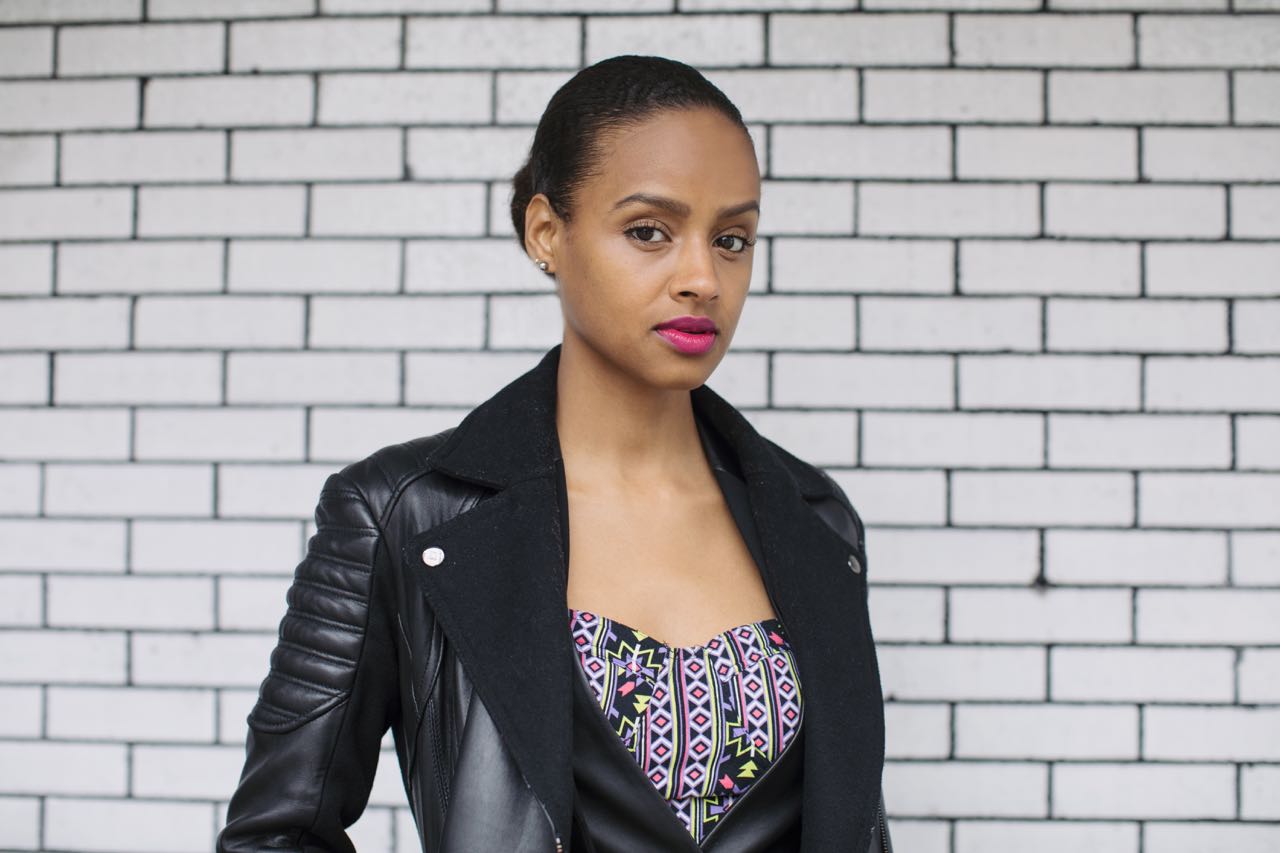
How have all of you found the process of figuring out how to have agency over your careers? Both in terms of roles and typecasting, and also in terms of how you deal with trying to have a personal life in a business that isn’t really built for that?
Annie: With everybody that I have in my life, I sort of put the disclaimer that they can’t rely on me for anything anymore. It’s like, “Look, I’ll try to be at your wedding, but if HBO calls, I’m not going to go, just so you know.” Being able to prioritize, and being able to be like, “I’ve canceled [my boyfriend and my] travel plans the last three times because something came up, so this time, I’m going,” and being able to find that balance to save your relationships. As far as the other thing, the thing that I’ve found that has been very satisfying is, okay, I can’t pick what I’m going to audition for and I can’t pick what I’m going to get, so if there’s something that I’m wanting to express that I’m not being able to do, then the best thing I can do is make it on my own. I think actors all over are taking a little bit more agency over their work now. They’re being a little less respectful [of the distinction] between actor and writer. So that’s what keeps me sane. It’s like, “Okay, I’m going to write this thing that I’m going to be in now,” and putting it up.
Sarah: I would agree. I co-founded a theatre company with three other actor friends, the Pond Theater Company, with the mission to do revivals of Irish and UK plays and also bring new plays over from the UK and Ireland that wouldn’t necessarily be in New York otherwise. We did our first one, which was a revival of Abigail’s Party in November at the Barrow Group. In terms of auditions, if I see something that I really think I’m right for that I want to go in for, I will move hell and high water to do what I can to get in for it. But as actors, there’s only so much control that we have. I have found it satisfying to be able to sit in a room with like-minded individuals and say, “What play should we work on?” It’s great to get hired for jobs—love that—but in the meantime, I always find that when I’m actually busy doing my other stuff, that’s when I tend to actually get jobs, because you’re not waiting around for emails or the phone to ring. I’m a big believer in energy. I think the universe sees that and is like, “Oh, here you go.” But it is also really empowering as an actor to be able to read plays and look at plays and say, “Hmm, should we produce this?” And the joy of being able to hire other actors and hire stage managers. There’s something really just wonderful about that. So that’s been a big thing for me this past year.
In terms of work-life balance, there have been times when I’ve had to cancel stuff on friends and my boyfriend. With finding a balance, I think sometimes you do have to put your personal life first. Obviously we all are very ambitious here, but there have been one or two occasions where I’m like, “I can’t not do this, so I’m going to have to say no to that audition.” It’s hard, because then you have this thing, “But what if I got it?”
Annie: I think, to a certain degree, you have to trust that whatever it is you’re doing is okay enough that you’re going to continue to get calls. Instead of, “Oh, this is the last audition.” I’ve been in that mindset before, and it is the worst.
Sarah: Even super famous actors say that they have that mindset, that they think every movie, that’s it.
Lakisha: My best, best, best friend is getting married the day before we open. I tried to move as much as I [could] and I petitioned, “Please, put the other show first.” But you just can’t. I was a bridesmaid, and now I just can’t. I wasn’t able to do anything for it. You do get sometimes to a place of, how long will you continually put things like that on hold? It can be really, really difficult. And obviously, I’m here, I’m doing the show, but it’s rough. It’s very hard on your relationships. My relationship with her is kind of strained right now. I feel really bad. And it’s hard. It forces you to have these difficult conversations, and I’ve created my own work and done all kinds of stuff, but it is a huge sacrifice. There are a lot of sacrifices that you take, particularly to do this type of Off-Broadway work, where the pay is better—thank you Fair Wage Onstage—however, you are not…
Sarah: Making millions.
Lakisha: Not even thousands. So the most I can do is just be grateful for the opportunity, and that I am using my presence and my artistry to impact and tell the story that wouldn’t necessarily be told.
Chinasa: You definitely miss moments. I think the older I get and the longer I’ve been in the business, which always feels weird to say, I’ve become more defensive of my time and my personal life. I choose my life more because I’m so aware of how fleeting the moments are. I choose my family, I choose my friends. There are moments where you have to miss the wedding, but you hope that those people will understand, because I know I would understand. It has taught me a lot more about self-care, and I now take my days off very seriously. I take my days off very seriously, and I really try to take care of my voice so that I can come back and do two shows in a day. I’ve noticed that I have become very much protective of my life and taking a vacation when I need to, and saying, “If the job is for me, it will be for me. If I’m meant to get this work, I will get it. Right now, I’m going to Italy, because I want to eat pasta, and that is important for my life and for my art, that I eat that pasta and be a happy person.”
Sarah: It sure is, because you know what? At the end of the day, if we all want to be artists, we have to experience life at the same time, because you need that to draw on.
